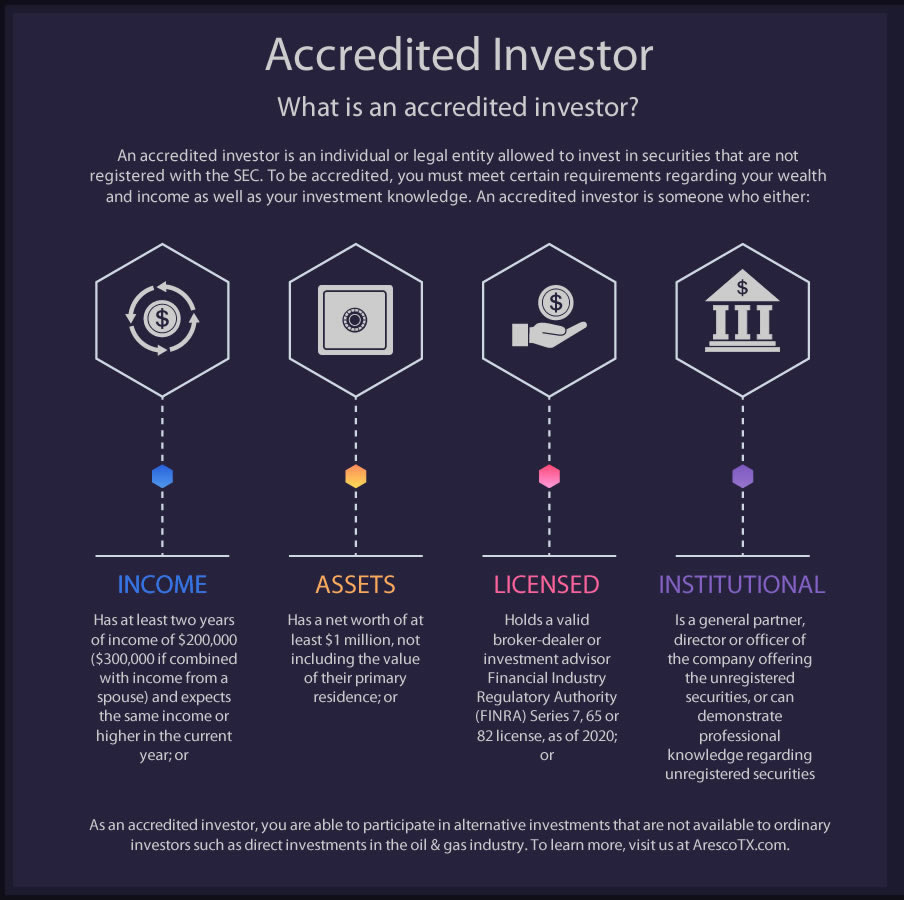All Categories
Featured
Table of Contents
A private should have a total assets over $1 million, excluding the key residence (independently or with partner or partner), to qualify as a certified financier. Demonstrating sufficient education or task experience, being a signed up broker or investment expert, or having certain specialist qualifications can also qualify a private as a certified investor.
Accredited financiers have accessibility to investments not registered with the SEC and can include a "spousal equivalent" when determining credentials. Certified capitalists may deal with possible losses from riskier financial investments and must verify financial sophistication to take part in uncontrolled financial investments (foreign accredited investor). Recognized financier standing issues because it establishes qualification for financial investment possibilities not readily available to the general public, such as exclusive placements, financial backing, bush funds, and angel investments
Accredited Investor Options

To take part, approved investors have to come close to the company of non listed safeties, who may need them to complete a set of questions and offer economic papers, such as tax returns, W-2 types, and account statements, to verify their status. Rules for accredited investors are overseen by the U.S. Stocks and Exchange Payment (SEC), making certain that they satisfy specific monetary and specialist requirements.
This expansion of the accredited financier pool is planned to keep investor protection while supplying greater access to non listed investments for those with the essential monetary class and threat resistance. - investor leads review
Accredited Investor Income Requirements
Property syndication is rather similar to REITs due to the fact that it also involves merging sources to acquire actual estate investments. A syndication deal is when several capitalists merge their resources with each other to get a single property home. This offer is assembled by a syndicator, likewise understood as the general enroller.
These investors will give most of the funding required to get the home. The difference with REITs is that you can select what syndication bargains to get involved in. If you rely on the property property being syndicated, you can join as one of the easy capitalists. Property syndication can be done with any kind of type of realty, however multifamily syndication is the most popular kind since multifamily homes typically generate a great deal of constant income.
These buildings generate constant money circulation with month-to-month rental income. In addition, these huge buildings are normally harder to get as a lone investor, which is why syndication is a perfect configuration. Investors can join multifamily realty spending with a much reduced minimum investment. The syndicator will certainly additionally be in fee of building management, indicating passive capitalists do not have to fret regarding becoming a property owner.
Certified financiers do not have to collect rental earnings, bargain with tenants, deal with emergencies, invest money on repair services, etc. Either the syndicator will certainly hire a third party home manager to do this or they will certainly manage it themselves.
Occasionally the syndicator has a bigger percent of the equity. The capital is generally split among the participants. This indicates financiers receive passive income from rents, and the ultimate building sales. This is based on what percent of the property they have, depending on the bargain structure.
Qualification Of Investors

Our point of views are our very own. An approved capitalist is an individual or establishment that can spend in uncontrolled protections.
Non listed protections are naturally dangerous but often supply greater rates of return. If you have actually ever encountered a financial investment offered only to supposed recognized financiers, you have actually likely questioned what the term indicated. The label can relate to entities ranging from large financial institutions and well-off Fortune 500 companies, completely to high-earning homes and even people.
, giving market access to smaller firms that might or else be squashed under the costs going along with SEC enrollment.
Financiers without certification can handle the complete breadth of authorized safeties like supplies, bonds, and shared funds. They can also build up wealth, acquisition property, construct retirement portfolios, take threats, and reap benefits the most significant difference is in the scale of these undertakings. Among the benefits of being a recognized financier is that as soon as you achieve this condition, it "opens" accessibility to items not readily available to the basic public, such as hedge funds, equity capital funds, personal equity funds, and angel investing.
The SEC considers hedge funds a more "flexible" investment method than something like shared funds, due to the fact that hedge funds make use of speculative techniques like utilize (reg d qualified investor) and short selling. Given that these complex products need added study and understanding, financiers require to demonstrate that they understand the dangers associated with these kinds of investments before the SEC is comfortable with them diving in
While several are mostly familiar with the SEC's consumer security efforts, the regulative authority's responsibilities are in fact twofold. To make sure that those two efforts aren't in dispute, it's sometimes required for the SEC to match up high-risk, high-reward chances with ideal financiers.
Sec Qualified Investor
One helps navigate the unregulated market, and the various other will drift you to safety and security should the waves endanger. The average financier is safe on the beach or paddling in the shallows, secure under the careful look of the lifeguard (i.e., the SEC). Safeties that are offered to recognized capitalists are provided with private offerings, which may feature fewer policies than protections provided to even more regular financiers.
By Percent - January 11, 2021 When it comes to acquiring stocks and bonds, virtually anyone can invest. As long as you more than the age of 18 (or 21, in some states), not trading on details, or not investing as component of a conflict of rate of interest, you can be a component of public markets whether you have $1 or $1 million.
Specific investment vehicles consisting of those on Percent are just readily available to a course of investors lawfully specified as These financiers have the specific permission from regulatory bodies based on a slim set of standards to invest in particular kinds of investments in exclusive markets. Who can be a certified financier? Much better yet, why are recognized investors a thing in the initial location?
The Stocks and Exchange Commission (SEC) ultimately embraced policy 501 of Law D, which formalized who can purchase personal offerings and specified the term "certified investor" a term that was later on upgraded in 2020. A recognized investor is any individual who fulfills any of the following requirements: Investors with earned revenue that surpassed $200,000 (or $300,000 along with a partner) in each of the prior two years, and anticipates to fulfill the very same benchmarks in the present year.
Those that are "knowledgeable employees" of a private fund. SEC- and state-registered investment consultants (however not reporting advisors) of these entities can likewise now be thought about accredited investors.
Institutional Accredited Investor

As an example, if you have a total assets of over $1 million (not including your main property/residence), made $200,000+ a year for the last 2 years, or have your Series 7 certificate, you can make investments as an accredited investments. There are lots of other credentials (as you can locate over), and the SEC intend on adding more in the future.
Because the early 1930s, federal government regulators have actually located it difficult to shield investors in personal offerings and securities while concurrently maintaining the development of startups and other young companies - companies that lots of think are in charge of most of work growth in the United States - accredited. Stabilizing this task had been leading edge of the mind of the Securities and Exchange Payment ("SEC") for many years
Latest Posts
Invest In Tax Liens Online
Buying Properties For Delinquent Taxes
List Of Homes Owing Back Taxes